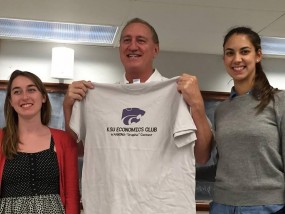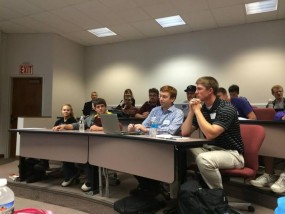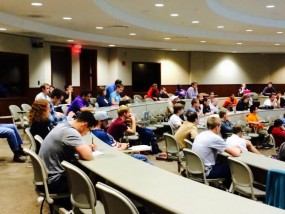
The cost of living for an average Kansas State University student has once again increased at a greater increase then the average cost of living for an American according to recently released data. The 2014 Student Price Index (SPI), compiled by the Kansas State University Economics Club, increased by 4.7 percent from 2013, significantly more than national averages over a comparable period. The SPI is based on prices collected on a bundle of goods a typical Kansas State University student purchases compared to the previous year’s prices. The increase in the SPI is attributed to prices rising in several key categories such as housing, tuition, and groceries. The 2014 SPI increase is less than the 2013 SPI increase which was 6.4 percent.
The SPI indicates a larger increase in prices than the national average. Figures by the U.S. Bureau of Labor Statistics indexing prices, paid by urban consumers across the nation, as measured by the U.S. Consumer Price Index indicated that national prices increased by1.7 percent over the preceding 12 months ending in and calculated in September 2014.
Since the economics club started collecting data for this project in September of 2002 the SPI has approximately doubled. This means the bundle of goods that a typical Kansas State student purchases has doubled in price since 2002, while the bundle of goods that a typical American consumes (indicated by the CPI) has increased in cost by only 31.5 percent.
Christa Deneault, Vice President of the Kansas State Economics Club, coordinated the efforts of several club members who visited local restaurants, grocery stores, gas stations, bars, bookstores, and movie theatres to gather information regarding annual pricing during the third week of September.
“According to our estimates,’ Deneault, an economics major from Concordia, said, ‘housing and tuition costs make up about two thirds of the average student budget. The price of these goods are up approximately five percent from last year. It is not a surprise that the overall SPI increased by just under five percent.”
“It may be a bit alarming for many people to see that the bundle of goods our typical student purchases has doubled since 2002.” said Dan Kuester, Faculty Advisor to the Economics Club. “It certainly has become relatively more expensive to attend college than to purchase other goods in the past twelve years but the overall value of a K-State degree continues to be a relative bargain in my opinion. There continues to be a significant wage and employment premium associated with earning a college degree at Kansas State.”
“This is a great project for our students every year,’ Kuester added. “We get the chance to demonstrate how a price index is calculated and our bundle closely mirrors what the BLS does with the Consumer Price Index. Christa was able to involve approximately twenty students with this project and during our club meetings we discuss how we can improve the SPI while continuing to provide consistent data.”
Hannah Jones, a senior economics major from Overland Park is the president of the economics club. “It is eye opening to recognize how severely college students are affected by inflation. The increase in the price level of groceries and beer (at four percent and twenty percent respectively) was not something that I anticipated observing. For better or worse, those students who elect not to buy beer are not as heavily impacted by inflation according to our study!”
Jesse Maine, a senior economics major from Shawnee, helped collect data for this project. “Part of my job was to compare movie prices from last year. I have noticed that the prices of some goods such as pizza and movies have experienced little or no inflation from last year. I believe this is because students in the Manhattan area have so many options as to how to spend their disposable income that some local businesses have to be highly competitive in their pricing.’
There was some good news in the data students collected. Pizza and ICAT ticket prices were unchanged while the price of internet services and gasoline fell.
Isa Cricco, a senior economics major from Paraguay, is the secretary of the economics club. “I was pleased to observe a fairly substantial (eleven percent) decrease in gasoline prices. This, along with housing prices, is very important to both our students and to the population at large.”
A breakdown of each section of the SPI is as follows:
Gasoline -11 percent
Groceries +4 percent
Tuition +5 percent
Beer +20 percent
Pizza unchanged
Non-greek housing +15 percent
Greek housing -5 percent
Textbooks +15 percent
Movies +3 percent
ICAT unchanged
Internet -12 percent





